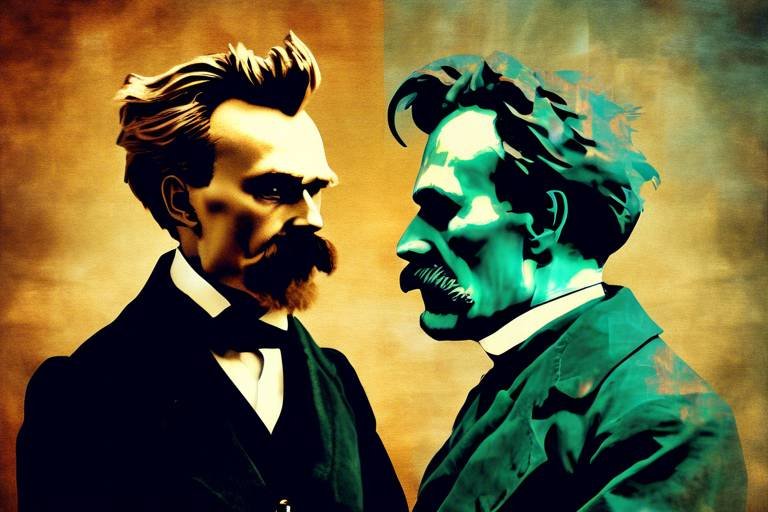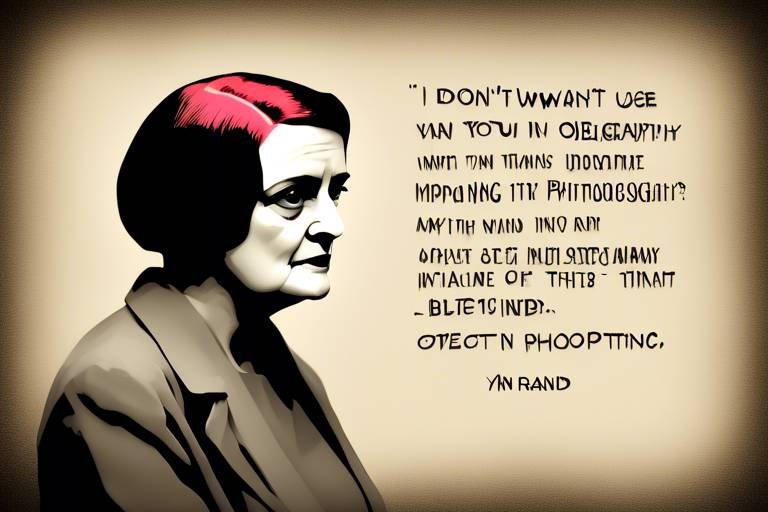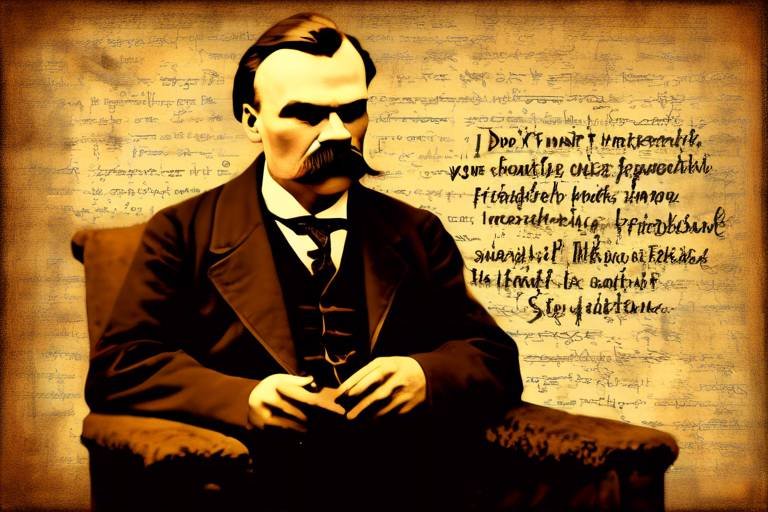Nietzsche vs. Kierkegaard - Different Perspectives on Existentialism
Existentialism is a philosophical movement that grapples with the essence of human existence, freedom, and the search for meaning in a seemingly indifferent universe. Among the titans of existential thought, Friedrich Nietzsche and Søren Kierkegaard stand out, each offering unique perspectives that continue to resonate in modern discussions. While both philosophers delve into the complexities of existence, their approaches diverge significantly, leading to contrasting interpretations of life's purpose and the nature of reality.
To understand their differences, it’s essential to explore the foundations of existentialism. Nietzsche, often associated with the idea of nihilism, challenges the very fabric of traditional morality and meaning. He posits that in the absence of a divine moral order, individuals must create their own values. On the other hand, Kierkegaard emphasizes the importance of faith and subjective experience, arguing that true meaning arises from a personal relationship with the divine. This foundational difference sets the stage for a rich philosophical dialogue between the two thinkers.
As we delve deeper into their philosophies, we can see how Nietzsche's assertion that "God is dead" serves as a clarion call for individuals to embrace their freedom and responsibility in crafting their own destinies. This notion of self-creation is juxtaposed against Kierkegaard's belief that faith is essential for overcoming despair and achieving true understanding. In essence, Nietzsche's existentialism is marked by a radical individualism, while Kierkegaard's perspective is deeply rooted in the necessity of community and relationships.
Both philosophers, despite their differences, have left an indelible mark on existential thought, challenging us to reflect on our beliefs, values, and the nature of our existence. By examining their contrasting views, we can gain a deeper appreciation for the complexities of life and the myriad ways in which we seek meaning in our own journeys.
Existentialism emerged as a reaction to the philosophical doctrines that preceded it, particularly rationalism and empiricism. It emphasizes the individual's experience, freedom, and choice as central themes. Nietzsche and Kierkegaard, though different in their approaches, both contributed significantly to the development of existential thought.
Nietzsche's philosophy is often characterized by a rejection of absolute truths and an embrace of subjective experience. He believed that traditional values were obsolete and that individuals must rise above societal norms to create their own values. In contrast, Kierkegaard argued that the individual's relationship with God is paramount, emphasizing the importance of faith and personal choice. This divergence in thought illustrates the rich tapestry of existentialism, where individual experience is both celebrated and questioned.
Nietzsche's exploration of nihilism is one of his most provocative contributions to existentialism. He argues that in a world devoid of inherent meaning, individuals face the daunting task of creating their own significance. This concept can be unsettling, as it challenges the comfort of established beliefs and moral frameworks. Nietzsche's call for the "Übermensch," or "Overman," embodies the idea that humans can transcend traditional values and forge new paths.
Conversely, Kierkegaard presents a counterpoint to nihilism through his emphasis on faith. He posits that while life may be filled with uncertainties, it is through a leap of faith that individuals can find purpose and meaning. For Kierkegaard, despair arises when one becomes disconnected from faith, leading to a sense of hopelessness. His philosophy suggests that true understanding comes not from rationality alone but from a deep, personal relationship with the divine.
Central to Nietzsche's philosophy is the concept of the will to power, which represents the inherent drive for growth, self-overcoming, and the assertion of one's values. This idea encapsulates Nietzsche's belief that life is a continuous struggle for mastery and creativity. Unlike Kierkegaard, who emphasizes the importance of faith, Nietzsche champions the individual's capacity to shape their own destiny through strength and determination.
Nietzsche's notion of self-overcoming is a powerful metaphor for personal growth. He encourages individuals to embrace challenges and reject societal norms that limit their potential. This journey of self-discovery requires courage and resilience, as it involves confronting one's fears and limitations. Nietzsche's philosophy invites us to ask ourselves: Are we willing to challenge the status quo and become the architects of our own lives?
In stark contrast, Kierkegaard emphasizes the role of faith as a means to overcome despair. He argues that true understanding and purpose arise from a personal relationship with the divine, which provides a foundation for navigating the uncertainties of life. For Kierkegaard, despair is not merely a feeling but a spiritual condition that can only be remedied through faith. This perspective highlights the importance of community and relationships in shaping one's identity and purpose.
Kierkegaard's concept of the leap of faith illustrates his belief that in the face of uncertainty, individuals must make subjective choices that defy rational understanding. This leap represents a commitment to faith, even when evidence may suggest otherwise. It is a profound act of courage, requiring individuals to embrace the unknown and trust in something greater than themselves. This idea stands in stark contrast to Nietzsche's rationalism, as Kierkegaard argues that true meaning often lies beyond the realm of reason.
The tension between individualism and community is another area where Nietzsche and Kierkegaard diverge significantly. Nietzsche's philosophy celebrates the individual as the creator of values, advocating for self-expression and self-creation. He believes that individuals should strive to break free from societal constraints and forge their own paths. This radical individualism is empowering but can also lead to isolation if not balanced with connections to others.
In Nietzsche's view, the individual is paramount, and the quest for personal identity is a solitary journey. He challenges us to question societal norms and embrace our unique perspectives. However, Kierkegaard argues that personal identity is shaped through relationships and social contexts. He emphasizes that our connections with others are essential for understanding ourselves and finding meaning in our lives.
Nietzsche's rejection of traditional morality contrasts sharply with Kierkegaard's focus on ethical responsibility. While Nietzsche advocates for the revaluation of values and the creation of personal ethics, Kierkegaard emphasizes the individual's duty to others within a community. This ethical dimension is crucial for Kierkegaard, as he believes that our relationships and responsibilities to others are fundamental to living a meaningful life.
- What is existentialism? Existentialism is a philosophical movement that focuses on individual existence, freedom, and the search for meaning.
- How do Nietzsche and Kierkegaard differ in their views on meaning? Nietzsche emphasizes self-creation and the absence of inherent meaning, while Kierkegaard believes in finding meaning through faith and relationships.
- What is the will to power? Nietzsche's concept of the will to power represents the drive for growth and self-overcoming.
- What does Kierkegaard mean by the leap of faith? The leap of faith is Kierkegaard's idea that individuals must make subjective choices in the face of uncertainty, trusting in something greater than themselves.

The Foundations of Existentialism
Existentialism is a rich and complex philosophical movement that emerged in the 20th century, but its roots can be traced back to earlier thinkers like Friedrich Nietzsche and Søren Kierkegaard. Both philosophers, though often seen as opposites, contributed significantly to the development of existential thought. They approached the fundamental questions of existence, meaning, and individuality from unique angles, helping shape the landscape of modern philosophy.
At its core, existentialism grapples with the essence of human existence, emphasizing the individual's experience and the subjective nature of reality. It challenges the notion of predetermined essence, suggesting instead that existence precedes essence. This means that individuals are not defined by external labels or societal norms; rather, they forge their own identities through choices and actions. Nietzsche and Kierkegaard, while differing in their conclusions, both emphasized the importance of personal responsibility in shaping one's life.
Nietzsche's philosophy is often associated with the idea of nihilism, the belief that life lacks inherent meaning. He provocatively declared that "God is dead," signaling a shift away from traditional religious values and the need for individuals to create their own meaning in a universe devoid of objective truth. This notion of self-creation is central to Nietzsche's thought, as he encourages individuals to embrace their freedom and assert their will to power.
On the other hand, Kierkegaard's existentialism is deeply rooted in the concept of faith. He believed that the search for meaning is not just an intellectual exercise but a deeply personal journey that involves a relationship with the divine. For Kierkegaard, faith is an act of courage, a leap into the unknown where one must confront despair and uncertainty. His emphasis on subjective truth highlights the importance of personal experience over abstract reasoning.
In exploring the foundations of existentialism, we can identify several key principles that both Nietzsche and Kierkegaard championed:
- Individual Experience: Both thinkers stress the importance of individual experience in understanding existence.
- Choice and Responsibility: Existentialism posits that individuals are responsible for their choices, which shape their identities.
- Search for Meaning: The quest for meaning is a central theme, with Nietzsche advocating for self-creation and Kierkegaard emphasizing faith.
Ultimately, the foundations of existentialism laid by Nietzsche and Kierkegaard invite us to reflect on our own lives. They challenge us to ask profound questions: What does it mean to exist? How do we find meaning in a seemingly indifferent universe? Their contrasting perspectives provide a rich tapestry of ideas that continue to resonate with those seeking to understand the complexities of human existence.

Nihilism and Meaning
Nihilism often gets a bad rap, and it’s easy to see why. When you hear the term, you might picture a bleak worldview where nothing has value or meaning. But let’s dive deeper into the thoughts of Friedrich Nietzsche, who is often associated with this concept. For Nietzsche, nihilism isn’t just about despair; it’s a critical phase in the evolution of human thought. He argued that the decline of traditional values, especially those rooted in religion, leads to a profound sense of emptiness. This emptiness, however, can be a catalyst for personal growth and self-discovery. Isn’t it fascinating how something that sounds so negative can actually be a stepping stone to greater understanding?
In stark contrast, Søren Kierkegaard viewed nihilism through a different lens. He believed that while life may seem devoid of meaning, it is through faith that we can find purpose. Kierkegaard posited that the individual must confront the absurdity of existence and make a leap of faith to discover subjective meaning. He emphasized that this leap is not a blind jump into the unknown, but rather a conscious choice made in the face of uncertainty. It’s like standing on the edge of a cliff, knowing that the jump will be terrifying, yet believing that there’s something worth leaping for. This leap is essential for true understanding and fulfillment.
To illustrate the contrasting views of nihilism and meaning between Nietzsche and Kierkegaard, consider the following table:
| Philosopher | Nihilism Perspective | Meaning Perspective |
|---|---|---|
| Friedrich Nietzsche | Decline of traditional values leads to emptiness | Embrace the void to create personal values |
| Søren Kierkegaard | Confronting absurdity can lead to despair | Faith is essential for finding subjective meaning |
So, how do these perspectives affect our understanding of meaning in life? Nietzsche's nihilism can be seen as a challenge to individuals to rise above societal expectations and create their own paths. He famously declared, "God is dead," which signifies the end of absolute truths and the beginning of a new era where individuals must forge their own meanings. On the flip side, Kierkegaard’s emphasis on faith suggests that while we may feel lost in a world that appears meaningless, there is still a route to finding purpose through personal relationships and spiritual connections.
Both philosophers compel us to confront the big questions: What is the meaning of life? How do we cope with the void left by lost beliefs? Nietzsche might argue that the absence of inherent meaning is liberating, while Kierkegaard would insist that faith is the anchor that keeps us grounded. It’s a fascinating dichotomy—one that continues to resonate in modern existential thought. Ultimately, the dialogue between nihilism and meaning is not just philosophical; it’s deeply personal, urging each of us to explore our beliefs and values in a world that can sometimes feel overwhelmingly chaotic.
In conclusion, the exploration of nihilism and meaning through the lenses of Nietzsche and Kierkegaard provides rich insights into the human experience. Their contrasting views encourage us to reflect on our own beliefs and the ways in which we seek meaning in our lives. Whether through the creation of personal values or the embrace of faith, the journey towards understanding remains a vital part of our existence.
- What is nihilism? Nihilism is the philosophical belief that life lacks inherent meaning or value.
- How does Nietzsche view nihilism? Nietzsche sees nihilism as a phase that can lead to personal growth and the creation of individual values.
- What is Kierkegaard's perspective on meaning? Kierkegaard believes that meaning can be found through faith and personal relationships.
- Can nihilism be a positive force? Yes, Nietzsche argues that confronting nihilism can lead to empowerment and self-discovery.

The Will to Power
Friedrich Nietzsche's concept of the will to power is a cornerstone of his philosophy, encapsulating the essence of human motivation and ambition. At its core, the will to power signifies an intrinsic drive within individuals to assert themselves, to grow, and to transcend their current limitations. Nietzsche posited that this drive is not merely about seeking power over others; rather, it is about self-overcoming and personal development. Think of it as the engine that fuels our desire to become the best versions of ourselves, pushing us to break free from mediocrity and embrace our potential.
In contrast to Kierkegaard's focus on faith and existential angst, Nietzsche's will to power invites us to embrace life with vigor and creativity. He believed that individuals should strive to create their own values and meanings instead of adhering to societal norms or traditional moralities. This idea can be likened to a sculptor who sees a block of marble not just as a stone but as a canvas for their masterpiece. Nietzsche encourages us to chisel away at our own lives, shaping our identities and destinies through our choices and actions.
The implications of the will to power extend beyond personal ambition; they resonate deeply within the fabric of society. Nietzsche argued that a flourishing culture is one that celebrates the will to power, fostering environments where individuals can express their creativity and assert their unique identities. This perspective challenges us to reconsider our roles within our communities. Are we merely conforming to existing structures, or are we actively participating in the creation of new values and ideas?
However, embracing the will to power is not without its challenges. Nietzsche recognized that this path requires a profound level of self-awareness and courage. It demands that we confront our fears, question our beliefs, and engage in a continuous process of self-reflection. This journey can be daunting, akin to climbing a steep mountain where the summit represents our highest potential. Yet, the reward for such effort is not only personal fulfillment but also the ability to inspire others to embark on their own journeys of self-discovery.
In summary, Nietzsche's will to power is a compelling invitation to explore the depths of our own potential. It challenges us to break free from the constraints of societal expectations and to embrace our individuality. As we navigate through life's complexities, we must ask ourselves: Are we merely existing, or are we actively creating our own paths? The will to power serves as a guiding light, urging us to take bold steps toward self-overcoming and personal transformation.
- What is the will to power? The will to power is Nietzsche's concept that describes the fundamental drive within individuals to assert themselves and achieve personal growth.
- How does the will to power differ from traditional views of power? Unlike traditional views that focus on domination over others, the will to power emphasizes self-overcoming and personal development.
- Why is the will to power important in Nietzsche's philosophy? It serves as a foundation for understanding human motivation and the creation of values, highlighting the importance of individual agency.
- Can the will to power be applied to everyday life? Absolutely! It encourages individuals to embrace challenges, seek personal growth, and actively shape their identities.

will to power
The concept of the is one of Friedrich Nietzsche's most profound and influential ideas. At its core, it represents the fundamental drive that motivates individuals to achieve, grow, and assert themselves in a world that often seems chaotic and indifferent. Nietzsche believed that this drive is not merely a quest for survival or dominance over others but rather an intrinsic desire for self-overcoming and personal excellence. Imagine life as a vast, uncharted ocean; the will to power is the wind that fills your sails, pushing you toward unimagined horizons.
Nietzsche's philosophy insists that the will to power is a universal principle that underlies all human behavior. It encourages individuals to transcend their limitations and societal expectations, urging them to become the architects of their own values and destinies. In this sense, the will to power is about embracing challenges and transforming obstacles into opportunities for growth. It is a call to rise above mediocrity and pursue greatness, much like a phoenix rising from the ashes.
To better understand the implications of the will to power, consider the following key aspects:
- Self-Overcoming: Nietzsche emphasized the importance of overcoming personal struggles and societal constraints. This process of self-overcoming is essential for individuals to realize their true potential.
- Creativity and Innovation: The will to power fuels creativity, encouraging individuals to innovate and challenge the status quo. It’s about breaking free from established norms and forging new paths.
- Affirmation of Life: Nietzsche's philosophy advocates for a robust affirmation of life, including its inherent struggles and suffering. The will to power is about embracing life in all its complexity.
In contrast to Kierkegaard's emphasis on faith and subjective meaning, Nietzsche's will to power presents a more secular and individualistic approach to existence. Where Kierkegaard sees faith as a means to navigate the uncertainties of life, Nietzsche views the will to power as a way to assert one's existence in a world devoid of inherent meaning. This divergence highlights a fundamental tension between their philosophies, as Nietzsche champions the individual’s capacity to create meaning through their actions, while Kierkegaard insists that true understanding comes from a relationship with the divine.
Ultimately, the will to power serves as a powerful reminder of the potential that lies within each individual. It challenges us to confront our fears, embrace our passions, and strive for greatness. In a world that often seems intent on keeping us in our place, the will to power urges us to break free, to explore, and to become who we are truly meant to be. It’s a call to action, a rallying cry for those willing to embrace the chaos of existence and transform it into something beautiful.
- What is the will to power? The will to power is a philosophical concept introduced by Nietzsche, representing the fundamental drive for growth, self-overcoming, and the creation of values.
- How does the will to power differ from Kierkegaard's philosophy? While Nietzsche's will to power emphasizes individualism and self-creation, Kierkegaard focuses on faith and the importance of relationships in shaping personal identity.
- Can the will to power be applied in everyday life? Yes, the will to power encourages individuals to embrace challenges, pursue personal excellence, and assert their unique values in various aspects of life.

is central to his philosophy, representing the drive for growth and self-overcoming, which stands in stark contrast to Kierkegaard's focus on individual faith.
Friedrich Nietzsche's concept of the will to power is a cornerstone of his philosophical framework, encapsulating the intrinsic drive that propels individuals toward growth, creativity, and self-overcoming. Imagine a river that carves its way through a rocky landscape, relentlessly pushing forward despite obstacles. This imagery perfectly illustrates Nietzsche's belief that life is a dynamic process, where the will to power is not merely about domination over others but rather an internal force that compels us to transcend our limitations and realize our potential.
In Nietzsche's view, the will to power manifests in various forms, such as the pursuit of knowledge, artistic expression, and personal development. It’s about embracing challenges and transforming them into opportunities for self-improvement. For Nietzsche, every struggle is a chance to emerge stronger and more self-aware. This perspective stands in stark contrast to the existential philosophy of Søren Kierkegaard, who emphasizes the importance of faith and the subjective experience of the individual.
While Nietzsche champions the individual as a creator of their own values, Kierkegaard focuses on the individual's relationship with the divine and the necessity of faith in navigating life's uncertainties. Kierkegaard would argue that true fulfillment comes not from the relentless pursuit of power or self-assertion, but from a deep, personal connection with God. This divergence raises intriguing questions about the nature of existence: Is it more meaningful to forge one’s path through sheer will, or to find solace in faith amidst the chaos of life?
To further illustrate the contrasting views of Nietzsche and Kierkegaard, consider the following table:
| Aspect | Nietzsche's Philosophy | Kierkegaard's Philosophy |
|---|---|---|
| Core Concept | Will to Power | Leap of Faith |
| Focus | Self-overcoming and individual growth | Faith and personal relationship with the divine |
| View on Struggles | Opportunities for growth | Tests of faith |
| Ultimate Goal | Creation of personal values | Understanding through faith |
Ultimately, the will to power encapsulates Nietzsche's vision of a life lived with vigor and intensity, where individuals are encouraged to embrace their innate desires and ambitions. In contrast, Kierkegaard’s emphasis on faith suggests that, in the face of existential despair, it is through surrendering to a higher power that one can find true meaning and purpose. This philosophical dichotomy invites us to reflect on our own lives: Are we driven by the will to assert ourselves and shape our destinies, or do we seek refuge in faith as a means to navigate the uncertainties of existence?

Self-Overcoming
In the realm of philosophy, Friedrich Nietzsche's concept of stands out as a beacon of personal empowerment and transformation. It encapsulates the idea that individuals are not merely products of their environment or circumstances but possess the inherent ability to redefine themselves. Imagine standing at the base of a mountain, looking up at its daunting peak. The journey ahead is filled with challenges, yet it is this very struggle that shapes your character and fortitude. Nietzsche believed that true strength lies in the willingness to confront and transcend one's limitations.
Self-overcoming is not just about personal growth; it is about embracing the chaos of life and using it as a catalyst for change. Nietzsche posited that by overcoming challenges, we can forge our own values and create meaning in a world that often feels indifferent. This philosophy resonates deeply in today's fast-paced society, where many feel lost in the noise of conformity and societal expectations. Nietzsche encourages us to break free from these chains and embark on a journey of self-discovery.
At the heart of self-overcoming is the idea of embracing struggle. Nietzsche argued that without struggle, there can be no growth. This can be likened to a muscle: it must be stressed and torn before it can rebuild stronger. In this way, challenges are not obstacles but rather opportunities for self-creation. Nietzsche famously asserted, "What does not kill me makes me stronger," which encapsulates this belief perfectly. By facing our fears and pushing through difficulties, we cultivate resilience and authenticity.
Moreover, Nietzsche's notion of self-overcoming invites us to challenge societal norms and expectations. He urged individuals to question the status quo and reject the values imposed upon them by society. This rejection is not an act of rebellion for its own sake; rather, it is a necessary step toward discovering one's true self. In a world where many adhere blindly to inherited beliefs, Nietzsche's philosophy serves as a clarion call to embrace individuality and creativity.
To further illustrate the concept of self-overcoming, consider the following key aspects:
- Embrace Discomfort: Growth often comes from stepping outside your comfort zone. Nietzsche encourages us to seek out challenges that push our boundaries.
- Redefine Failure: Instead of viewing failure as a setback, see it as a stepping stone toward greater achievements. Each failure is an opportunity to learn and evolve.
- Forge Your Own Path: Reject societal pressures and create your own values. Self-overcoming requires a commitment to authenticity and personal integrity.
In conclusion, Nietzsche's concept of self-overcoming is a powerful reminder that we hold the keys to our own transformation. It invites us to embrace life's struggles, redefine our values, and ultimately, become the architects of our own existence. In a world that often tries to dictate who we should be, Nietzsche's philosophy empowers us to take control of our narratives and strive for greatness.
- What is self-overcoming according to Nietzsche? Self-overcoming is the process of challenging oneself to grow beyond limitations and societal expectations, ultimately creating one's own values.
- How can I practice self-overcoming in my life? Embrace challenges, redefine failures as learning experiences, and strive for authenticity in your personal and professional life.
- Why is self-overcoming important? It fosters personal growth, resilience, and a deeper understanding of oneself, allowing individuals to live more fulfilling and meaningful lives.

Faith and Despair
When we dive into the philosophical depths of Søren Kierkegaard, we quickly discover that he views faith as an essential antidote to despair. For Kierkegaard, despair is not just a fleeting emotion; it’s a profound condition of the human spirit. It’s that nagging sense of disconnection and existential angst that can grip us when we feel lost in the chaos of life. Imagine standing at the edge of a vast abyss, where the ground beneath you seems to crumble away—this is despair. Kierkegaard argues that the only way to overcome this chasm is through a leap of faith, a personal commitment to something greater than oneself.
Kierkegaard posits that faith is a deeply subjective experience, one that requires us to embrace uncertainty. This leap is not a blind jump into the unknown but rather a conscious choice to trust in the divine, despite the overwhelming odds stacked against us. In his view, faith is a paradox; it demands that we acknowledge our limitations while simultaneously reaching out for something transcendent. This duality is beautifully captured in his famous assertion that “the greater the risk, the greater the reward.”
In contrast, despair often stems from our attempts to find meaning through external validations—societal expectations, material success, or even the approval of others. Kierkegaard warns against this trap, suggesting that when we anchor our identities in external factors, we inevitably set ourselves up for disappointment. The more we rely on the world to define us, the deeper we sink into despair. Instead, he encourages us to look inward and cultivate a personal relationship with the divine, which can provide a solid foundation amid life's uncertainties.
To illustrate this point further, we can consider the following key aspects of Kierkegaard's philosophy regarding faith and despair:
- Personal Relationship with the Divine: Kierkegaard emphasizes that true understanding and purpose arise from an intimate connection with God.
- Subjectivity in Faith: Faith is a deeply personal journey that varies from individual to individual, highlighting the uniqueness of each person's experience.
- Overcoming Despair: Embracing faith allows individuals to confront their despair and transform it into a source of strength.
Ultimately, Kierkegaard's exploration of faith and despair invites us to confront our own existential dilemmas. He challenges us to ask ourselves: What do we truly believe in? Are we willing to take that leap of faith, despite the uncertainty? By embracing faith, we can find meaning and purpose, transforming our despair into a powerful catalyst for personal growth. In a world that often feels chaotic and unpredictable, Kierkegaard’s insights remind us that faith is not merely a belief system; it’s a way of navigating the complexities of existence.
- What is the primary difference between Kierkegaard's and Nietzsche's views on faith?
Kierkegaard sees faith as essential to overcoming despair, while Nietzsche often critiques faith as a hindrance to individual self-creation. - How does Kierkegaard define despair?
Despair is viewed as a profound disconnection from one's true self and a lack of faith in something greater. - Can despair be overcome?
Yes, Kierkegaard believes that through a personal leap of faith, individuals can transcend despair and find meaning.

The Leap of Faith
Kierkegaard’s concept of the leap of faith is a pivotal idea that invites us to embrace uncertainty and make personal choices that transcend rationality. It’s like standing at the edge of a cliff, peering into the unknown, and deciding to jump—not because you can see what lies below, but because you trust that something is there to catch you. This notion starkly contrasts with Nietzsche’s rationalism, which often emphasizes logic and empirical evidence over subjective experience. For Kierkegaard, the leap of faith is a profound act of courage, a recognition that life’s most significant truths often lie beyond the realm of reason.
In Kierkegaard’s view, faith is not merely a passive acceptance of doctrines; it is an active, dynamic process that requires the individual to confront despair and uncertainty. This leap is about making a choice, often in the face of doubt and fear, to believe in something greater than oneself. It’s a personal commitment that can lead to a deeper understanding of existence and self. Imagine standing at a crossroads, with one path leading to a familiar yet unfulfilling life, while the other is shrouded in mystery. The leap of faith compels you to take that uncertain path, trusting that it will lead to growth and enlightenment.
The implications of this leap are profound. By choosing to believe, individuals can cultivate a sense of purpose and identity that is not dictated by societal norms or external validation. Kierkegaard emphasizes that this leap is deeply personal; it cannot be made on behalf of another. Each person must confront their own existential dilemmas and make their own leap. This idea resonates with many modern existentialists who argue that authenticity comes from embracing one’s own choices, even when they defy conventional wisdom.
To illustrate, consider the following key aspects of the leap of faith:
- Subjectivity: The leap is inherently subjective, emphasizing personal belief over objective truth.
- Commitment: It requires a commitment to a belief system, regardless of the uncertainties that accompany it.
- Transformation: The act of leaping can lead to personal transformation and a deeper understanding of oneself.
In conclusion, Kierkegaard’s leap of faith challenges us to embrace uncertainty and make choices that define our existence. It invites us to step away from the comfort of reason and into the realm of belief, where true meaning and purpose await. This concept remains relevant today, as we navigate a world filled with ambiguity and complexity. Just as Kierkegaard suggested, perhaps the most profound journeys begin with a simple leap into the unknown.
- What is the leap of faith according to Kierkegaard?
The leap of faith is the act of making a personal commitment to believe in something, despite the uncertainties and doubts that may arise.
- How does the leap of faith differ from Nietzsche's philosophy?
While Kierkegaard emphasizes subjective belief and personal choice, Nietzsche focuses on rationality and the creation of one's own values.
- Why is the leap of faith important in existential philosophy?
The leap of faith underscores the significance of personal agency and the pursuit of meaning in an often chaotic and uncertain world.

leap of faith
The concept of the is one of Søren Kierkegaard's most profound contributions to existential thought. It encapsulates the idea that in the face of uncertainty and doubt, one must make a personal, subjective choice to embrace faith. This leap is not merely a blind jump into the unknown; rather, it is an act of courage that acknowledges our limitations and the inherent unpredictability of life. Kierkegaard believed that true understanding and purpose arise from this intimate relationship with the divine, which often requires us to step beyond the rational and the empirical.
In Kierkegaard's philosophy, the leap of faith represents a crucial turning point for individuals. It challenges us to confront our fears and uncertainties, pushing us to take risks for the sake of our beliefs. Unlike Nietzsche, who emphasizes rationality and the will to power, Kierkegaard posits that faith transcends reason. This is not to say that reason is unimportant; rather, it serves as a foundation that must eventually give way to something greater—faith itself. Kierkegaard famously stated, "Faith is the highest passion," highlighting that the act of believing is not just a mental assent but a passionate commitment to something beyond ourselves.
To illustrate this concept further, consider the following aspects of the leap of faith:
- Subjectivity: The leap of faith is deeply personal and subjective. Each individual must grapple with their own beliefs and doubts, leading to a unique journey of faith.
- Risk: Embracing faith often involves significant risks. The leap requires letting go of certainty and comfort, which can be daunting.
- Transformation: Taking the leap can lead to profound personal transformation. It challenges us to grow, adapt, and redefine our understanding of existence.
Kierkegaard's leap of faith stands in stark contrast to Nietzsche's rationalism. While Nietzsche encourages individuals to forge their own paths through strength and self-overcoming, Kierkegaard insists that there are moments when logic and reason fall short. In those moments, faith becomes essential—a guiding light in the darkness of uncertainty. This divergence highlights the broader philosophical divide between the two thinkers, each offering valuable insights into the human condition.
Ultimately, the leap of faith is about recognizing that life is filled with uncertainties and that embracing these uncertainties is a vital part of our existence. It compels us to ask ourselves: What do we truly believe in? What are we willing to risk for those beliefs? In a world where answers are often elusive, Kierkegaard's leap invites us to take that bold step forward, trusting that our faith can provide meaning and direction amid the chaos.
1. What is the leap of faith according to Kierkegaard?
The leap of faith is a personal commitment to believe in something greater than oneself, even in the face of uncertainty and doubt. It emphasizes the importance of subjective choice in the journey of faith.
2. How does the leap of faith differ from Nietzsche's philosophy?
While Kierkegaard's leap of faith focuses on embracing faith and the subjective experience, Nietzsche emphasizes rationality, self-overcoming, and the creation of one’s own values without reliance on traditional beliefs.
3. Why is the leap of faith considered transformative?
The leap of faith can lead to profound personal transformation as it challenges individuals to confront their fears, embrace uncertainty, and grow beyond their current understanding of existence.
4. Can the leap of faith apply to everyday life?
Absolutely! The leap of faith can manifest in various aspects of life, such as relationships, career choices, and personal beliefs, encouraging individuals to take risks and make meaningful commitments.

illustrates his belief in the necessity of making a subjective choice in the face of uncertainty, a stark departure from Nietzsche's rationalism.
Existentialism is a philosophical movement that emphasizes individual existence, freedom, and choice. It arose as a response to the limitations of rationalism and empiricism. Friedrich Nietzsche and Søren Kierkegaard are two titans of this movement, each offering unique insights that have shaped modern existential thought. While Nietzsche champions the idea of creating one's own values in a seemingly indifferent universe, Kierkegaard emphasizes the importance of faith and subjective meaning. Their contrasting views provide a rich tapestry of ideas that continue to resonate today.
Nihilism, a concept often associated with Nietzsche, posits that life lacks inherent meaning. This perspective can be unsettling, as it challenges the very foundations of traditional morality and purpose. Nietzsche argues that in the absence of a divine framework, individuals must forge their own paths. In stark contrast, Kierkegaard asserts that faith is essential for overcoming despair and finding true meaning. For him, subjective truth and personal relationships with the divine are paramount.
At the heart of Nietzsche's philosophy is the concept of the will to power. This idea encapsulates the drive for growth, self-overcoming, and the assertion of one's existence. Nietzsche believes that to truly live, one must embrace challenges and reject societal norms. This drive is not merely about dominance over others but rather about mastering oneself and one's circumstances. Conversely, Kierkegaard's focus is on individual faith, suggesting that true fulfillment comes from a relationship with God rather than the pursuit of power.
Self-overcoming is a crucial aspect of Nietzsche's philosophy. He encourages individuals to confront their limitations and societal constraints head-on. By doing so, one can achieve personal fulfillment and authenticity. Nietzsche's idea is akin to a phoenix rising from its ashes; it embodies transformation and rebirth. Embracing challenges allows individuals to transcend their current state and unlock their potential.
In contrast, Kierkegaard emphasizes faith as a means to overcome despair. He posits that despair arises from a disconnect with one's true self and the divine. For Kierkegaard, understanding and purpose come from a personal relationship with God. This relationship is not merely about belief but involves a profound commitment to faith amidst uncertainty. It’s as if Kierkegaard is saying that in the chaotic dance of life, faith is the anchor that keeps us grounded.
Kierkegaard's concept of the leap of faith illustrates his belief in the necessity of making a subjective choice in the face of uncertainty, a stark departure from Nietzsche's rationalism. For Kierkegaard, the leap of faith is not a blind jump; rather, it is a conscious decision to embrace faith despite the absence of empirical evidence. This leap is deeply personal and requires individuals to confront their fears and doubts. It’s akin to standing at the edge of a cliff, knowing that the leap may lead to either liberation or peril. In this way, Kierkegaard's philosophy invites us to engage with our uncertainties, suggesting that true meaning often lies beyond the realm of rational thought.
While Nietzsche advocates for individualism and self-creation, Kierkegaard emphasizes the importance of community and relationships in shaping one’s identity. This tension between the individual and the collective is a recurring theme in existential thought.
Nietzsche celebrates the individual as the creator of values, arguing that personal identity is forged through unique experiences and choices. On the other hand, Kierkegaard contends that our identities are intricately linked to our relationships with others and the communities we inhabit. This interplay highlights the complexity of human existence, where both personal and social dimensions are crucial.
Nietzsche's rejection of traditional morality stands in stark contrast to Kierkegaard's focus on ethical responsibility. While Nietzsche encourages individuals to create their own moral frameworks, Kierkegaard believes that our duties to others within a community are paramount. This ethical dimension adds depth to their philosophies, prompting us to consider how our actions impact those around us.
- What is existentialism? Existentialism is a philosophical movement that emphasizes individual freedom, choice, and the search for meaning in a seemingly indifferent universe.
- How do Nietzsche and Kierkegaard differ in their views on meaning? Nietzsche views meaning as subjective and argues for self-creation, while Kierkegaard emphasizes faith as essential for finding true meaning.
- What is the leap of faith? The leap of faith is Kierkegaard's concept that emphasizes making a subjective choice in the face of uncertainty, contrasting with Nietzsche's rational approach.
- Why is individualism important in Nietzsche's philosophy? Nietzsche advocates for individualism as a means of self-creation, encouraging people to forge their own values and paths in life.
- How does Kierkegaard view community? Kierkegaard believes that personal identity is shaped through relationships and social contexts, highlighting the importance of community in one's life.

Individualism vs. Community
When we dive into the philosophical waters of Friedrich Nietzsche and Søren Kierkegaard, we find ourselves grappling with two distinct yet intertwined concepts: individualism and community. Nietzsche's philosophy is a vibrant tapestry woven with threads of personal empowerment and self-creation. He champions the idea that individuals are the architects of their own values, urging us to break free from societal constraints and embrace our unique paths. In his view, the individual is not merely a cog in the machine of society but a bold creator, capable of shaping their destiny.
On the flip side, Kierkegaard presents a contrasting narrative. He emphasizes the importance of community and relationships in the formation of identity. For him, personal identity is not an isolated endeavor; rather, it is deeply embedded in our connections with others. Kierkegaard argues that we are shaped by our interactions and the ethical responsibilities we hold towards those around us. This perspective invites us to consider how our individual choices resonate within the larger fabric of community life.
To illustrate this dynamic, let's explore a few key points:
- Nietzsche's Individualism: He believes that true greatness arises from embracing one's individuality and forging one's path, even if it means standing against societal norms.
- Kierkegaard's Communal Focus: He posits that our relationships with others, especially within a community, are crucial for understanding our place in the world.
- The Balance: Both philosophers, while advocating for different approaches, highlight the necessity of finding a balance between self-identity and community responsibility.
This tension between individualism and community is not just a philosophical debate; it is a living reality that many of us navigate daily. Think about it: in our quest for personal achievement, how often do we overlook the impact of our actions on those around us? Conversely, in our desire to belong, do we sometimes suppress our true selves? These questions echo the existential dilemmas both Nietzsche and Kierkegaard grappled with, reminding us that the journey of self-discovery is often intertwined with the lives we touch.
As we reflect on these contrasting views, it becomes clear that neither individualism nor community can stand alone. They are two sides of the same coin, each enriching our understanding of existence. Nietzsche's call to embrace the self encourages us to explore our potential, while Kierkegaard's emphasis on community reminds us that our growth is often nurtured by the relationships we cultivate. In the end, perhaps the true essence of our identity lies in the delicate dance between these two forces.
- What is the main difference between Nietzsche and Kierkegaard regarding individualism?
Nietzsche emphasizes the importance of self-creation, while Kierkegaard highlights the role of community and relationships in shaping identity. - Can individualism and community coexist?
Yes, both concepts can coexist and even complement each other, as personal growth often occurs within the context of social interactions. - How do Nietzsche's and Kierkegaard's views impact modern existential thought?
Their contrasting views encourage a deeper exploration of personal values and ethical responsibilities in contemporary society.

The Role of the Individual
When we dive into the philosophical waters of Friedrich Nietzsche and Søren Kierkegaard, we quickly realize that the role of the individual is a central theme that shapes their contrasting views. Nietzsche, with his bold proclamations, champions the idea of the individual as the ultimate creator of values. He believes that each person has the power to define their own existence, to sculpt their identity through their choices and actions. This perspective is invigorating, as it liberates individuals from the shackles of societal norms and traditional morality. Nietzsche's famous declaration, "God is dead," is not merely a statement about religion; it’s a clarion call for individuals to rise and take responsibility for their own lives and beliefs.
On the flip side, we have Kierkegaard, who paints a different picture. He argues that while the individual is indeed important, personal identity is not formed in a vacuum. Instead, it is shaped through relationships and social contexts. For Kierkegaard, the essence of being human is found in our connections with others and our responsibilities to them. He posits that we cannot exist in isolation; our interactions with family, friends, and community are essential in crafting who we are. This view suggests that the individual is not just a solitary creator but also a participant in a larger tapestry of human experience.
To illustrate the contrast between these two thinkers, let’s consider the following table:
| Aspect | Nietzsche | Kierkegaard |
|---|---|---|
| View of the Individual | Creator of values and meanings | Shaped by relationships and community |
| Morality | Rejection of traditional morality | Emphasis on ethical responsibility |
| Isolation vs. Community | Celebrates isolation for self-discovery | Highlights the importance of community |
This divergence leads to a rich discussion about the individual's role in society. Nietzsche's philosophy encourages a form of radical individualism where one must break free from societal constraints to achieve true greatness. He invites us to challenge the status quo, to embrace our instincts, and to pursue our passions without apology. In contrast, Kierkegaard urges us to recognize our interconnectedness with others. He suggests that while we may strive for personal authenticity, we must also remain mindful of our obligations to those around us.
Ultimately, the debate between these two philosophers raises some intriguing questions: Can one truly be an individual without the influence of others? Is it possible to create meaning in a world where we are inherently social beings? These questions not only challenge our understanding of identity but also compel us to reflect on our own lives. Are we more like Nietzsche, forging our own paths, or do we resonate more with Kierkegaard, finding our place within the community? Perhaps, in the end, the answer lies somewhere in between, where the individual and the community coexist and enrich one another.
- What is the main difference between Nietzsche and Kierkegaard's view of the individual?
Nietzsche emphasizes the individual's ability to create their own values, while Kierkegaard focuses on the importance of community and relationships in shaping one's identity. - How does Nietzsche's idea of the "will to power" relate to individualism?
Nietzsche's "will to power" suggests that individuals have an inherent drive to grow, overcome challenges, and assert their own values, which is a fundamental aspect of individualism. - Why does Kierkegaard believe community is essential for individual identity?
Kierkegaard argues that personal identity is not formed in isolation; rather, it is deeply influenced by our relationships and social contexts, highlighting our responsibilities to others.

The Ethical Dimensions
When we dive into the ethical dimensions of Nietzsche and Kierkegaard, we stumble upon a fascinating landscape where morality is not just a set of rules but a reflection of one's very essence. Nietzsche, with his bold proclamations, challenges the foundations of traditional morality. He argues that conventional ethics are mere constructs, often imposed by societal norms and religious doctrines. Instead, he champions the idea of the "Übermensch" or "Overman," an individual who creates their own values and lives authentically, free from the shackles of societal expectations. For Nietzsche, morality is fluid, a canvas on which each person paints their own meaning.
On the other hand, Kierkegaard presents a starkly different view. He emphasizes the importance of ethical responsibility, suggesting that our actions should be guided by a sense of duty to others. Kierkegaard posits that true ethical living arises from our relationships and commitments within a community. This perspective is particularly significant because it anchors individual identity in the fabric of social interactions. He believes that our choices and the weight of our decisions are intertwined with the lives of those around us. In this sense, ethics becomes a communal affair, where personal integrity is shaped by our obligations to others.
To illustrate the contrast between these two philosophers, consider the following table:
| Aspect | Nietzsche | Kierkegaard |
|---|---|---|
| View on Morality | Fluid and subjective; created by the individual | Objective and relational; rooted in community |
| Role of the Individual | Creator of values | Shaped by relationships |
| Ethical Responsibility | Self-overcoming and authentic living | Commitment to others and community |
Nietzsche's rejection of traditional morality raises a compelling question: If we are to create our own values, how do we ensure those values do not lead to chaos or harm? This is where Kierkegaard's emphasis on ethical responsibility becomes crucial. He argues that without a sense of duty to others, the individual risks falling into a nihilistic abyss, where the absence of shared values can lead to despair. Kierkegaard's perspective serves as a counterbalance to Nietzsche's radical individualism, reminding us that while we may forge our own paths, we are not isolated beings; our lives are interconnected.
In essence, the ethical dimensions of Nietzsche and Kierkegaard invite us to explore the delicate balance between individual freedom and communal responsibility. While Nietzsche encourages us to break free from conventional morality and embrace our unique paths, Kierkegaard implores us to remember that our choices echo in the lives of others. This dynamic interplay between self-creation and social obligation forms the crux of their philosophical debates, urging us to reflect on how we navigate the complexities of ethics in our own lives.
- What is the main difference between Nietzsche and Kierkegaard's views on morality?
Nietzsche believes morality is subjective and created by the individual, while Kierkegaard sees it as rooted in community and ethical responsibility to others.
- How does Nietzsche's concept of the Übermensch relate to ethics?
The Übermensch represents an individual who creates their own values and lives authentically, challenging traditional moral frameworks.
- Why is Kierkegaard's emphasis on community important?
Kierkegaard argues that personal identity and ethical living are shaped through relationships and commitments to others in a community.
Frequently Asked Questions
- What are the main differences between Nietzsche and Kierkegaard's views on existentialism?
Nietzsche and Kierkegaard offer contrasting perspectives on existentialism. Nietzsche emphasizes the concept of the will to power and the importance of individual self-creation, advocating for a life lived without traditional moral constraints. On the other hand, Kierkegaard focuses on the necessity of faith and the individual's relationship with the divine, highlighting the importance of subjective meaning and ethical responsibility within a community.
- How does Nietzsche's concept of nihilism differ from Kierkegaard's belief in faith?
Nihilism, as presented by Nietzsche, suggests that life lacks inherent meaning, prompting individuals to create their own values. In contrast, Kierkegaard argues that true meaning is found through a personal leap of faith, where individuals embrace uncertainty and make subjective choices that connect them to a higher purpose. While Nietzsche sees nihilism as a challenge to overcome, Kierkegaard views faith as a solution to despair.
- What role does individualism play in Nietzsche's philosophy?
Individualism is central to Nietzsche's philosophy, where he champions the idea of the individual as a creator of values. He believes that each person should strive for self-overcoming and reject societal norms to achieve personal fulfillment. This stands in stark contrast to Kierkegaard, who emphasizes that identity is shaped through relationships and the community, suggesting that our connections with others are crucial for personal development.
- Can you explain Kierkegaard's concept of the leap of faith?
Kierkegaard's leap of faith refers to the act of making a subjective choice in the face of uncertainty and doubt. He argues that to find true meaning and purpose, one must take this leap, embracing faith in the divine despite the lack of rational evidence. This concept highlights the importance of personal commitment and the transformative power of faith, contrasting sharply with Nietzsche's more rational and individualistic approach.
- How do Nietzsche and Kierkegaard view morality and ethics?
Nietzsche challenges traditional morality, advocating for a reevaluation of values and the rejection of societal norms that he believes restrict individual potential. Conversely, Kierkegaard emphasizes ethical responsibility, asserting that individuals have duties to others within their communities. He believes that morality is not just about personal freedom but also about the relationships and commitments we uphold in society.



















